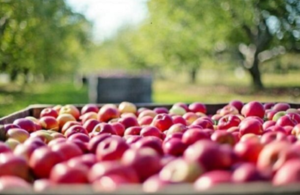Tech and innovation drive to boost food production and back British farmers
Government food strategy will back our farmers by helping to increase domestic production, spread jobs and grow the economy.

Picture of apples in a crate
Plans to drive innovation and harness pioneering technology in farming will be set out today as part of the Government’s Food Strategy which will back our farmers by helping to increase domestic production, spread jobs and grow the economy.
Currently, the UK only produces 15% of tomatoes supplied domestically, but new generation technology, such as sustainable and efficient glasshouses, has opened up new opportunities for British producers which will help to reduce reliance on overseas production.
The plans outlined today – including incentives for industry and investment in research - will support farmers to harness this innovation to boost home-grown fruit and vegetable production, and in turn create new job opportunities across the country.
In light of the consequences of Russia’s illegal invasion of Ukraine for the global economy, which has caused knock on impacts for food supplies as well as spikes in prices, the Strategy will also set out the importance of maintaining and boosting our food security, including plans to strengthen the resilience of our supply chains and boost domestic production to help protect against future economic shocks and crises.
It commits to broadly maintaining the current level of food that we produce domestically and boosting production in sectors where there are the biggest opportunities – such as horticulture and seafood.
£270 million will be invested across farming innovation funding programmes until 2029, to unlock technologies to drive sustainable farming techniques which will help increase productivity and profitability and the sector’s long-term resilience.
As well as stepping up work with industry to identify ways to help more people into jobs all along the food supply chain, the strategy also sets out plans to create a new professional body for the farming and growing industry to step up professional training and develop clear career pathways, equipping people and businesses with the skills needed to run sustainable and profitable businesses.
Prime Minister Boris Johnson said
Our Food Strategy sets out a blueprint for how we will back farmers, boost British industry and help protect people against the impacts of future economic shocks by safeguarding our food security.
Harnessing new technologies and innovation, we will grow and eat more of our own food - unlocking jobs across the country and growing the economy, which in turn will ultimately help to reduce pressure on prices.
Environment Secretary George Eustice said:
The food industry is bigger than the automotive and aerospace industries combined, offering employment opportunities, apprenticeships and investment in research and development.
The strategy we are setting out today will increase the focus on skills in the food sector, and the roles and career pathways available. In particular, we will seek to boost our horticulture industry and ensure the expertise needed to develop the sector here in the UK.
The Strategy follows the independent review of the food system by Henry Dimbleby last year, which set out an analysis of the challenges facing the food system.
The Government Food Strategy responds to these findings and recommendations, accepting the majority of recommendations, with policy initiatives to boost health, sustainability, accessibility of diet to secure food supply, while also recognising the shared global challenges of the war in Ukraine and the impact of the pandemic on the global economy
The strategy also includes plans to:
-
Consult on an ambition for 50% of public sector expenditure on food procurement to be on food either produced locally or to higher standards
-
Incentivise the sector to use surplus heat and CO2 from industrial processes, and renewable sources of energy to increase domestic horticultural production
-
Review the planning permission process to support new developments of glasshouses
-
Launch an independent review to tackle labour shortages in the food supply chain, to look at the roles of automation, domestic labour and migration to ensure UK businesses can access the labour they require
-
Consult on how to improve on and expand animal welfare labelling, to help consumers identify when products meet or exceed our high UK animal welfare standards
-
Extend the Seasonal Workers visa route to poultry, following a successful pilot last year
-
Publish a framework for land use in England next year
-
Consult on food waste reporting for larger businesses over a certain size
-
Publish a statement setting out requirements for those wishing to access the UK market to objectively demonstrate they deliver an equivalent level of health protection to our high domestic standards
-
Explore how to make the most of innovative feed additives that can reduce methane emissions from livestock, to support sustainable farming
-
Launch a new partnership between the public and private sector to provide consumers with more information about the food they eat while incentivising industry to produce healthier, more ethical and sustainable goods